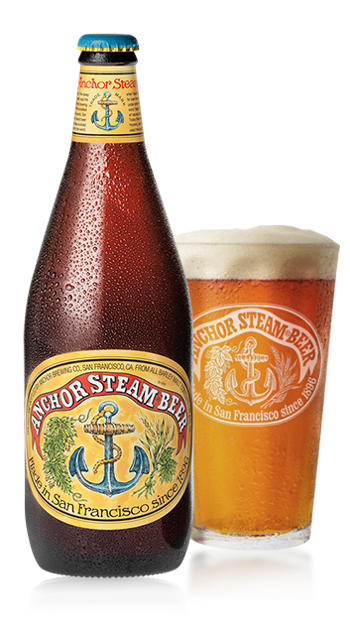Anchor Brewing Company's Demise: A Look Back At Its Legacy

Table of Contents
Anchor Brewing's Pioneering Role in the Craft Beer Revolution
Anchor Brewing Company, established in San Francisco in 1896, wasn't always a craft brewery giant. Its resurgence, beginning in the 1960s under Fritz Maytag's stewardship, is inextricably linked to the American craft beer revolution. Anchor Steam Beer, with its unique, slightly hazy appearance and balanced flavor profile, became a flagship beer and a symbol of this movement. Its success was built on several key factors:
- Early adoption of unique brewing techniques: Anchor revived traditional brewing methods, utilizing a unique, hybrid lager/ale process to create its signature steam beer. This experimentation laid the groundwork for many subsequent craft brewing innovations.
- Establishment of a distinct brand identity and flavor profile: Anchor Steam Beer's distinctive taste, unlike anything else on the market at the time, carved out a unique niche and solidified its place in the hearts (and palates) of beer drinkers.
- Influence on subsequent generations of brewers: Many current craft brewers cite Anchor as a major inspiration, highlighting its commitment to quality and innovation as a model for success.
- Key milestones in Anchor's early history: From its revival under Maytag to its expansion and increasing popularity, Anchor's early years cemented its place as a craft beer pioneer. The introduction of other notable beers further solidified its position in the market.
The Rise of Mega-Breweries and Increased Competition
The craft beer landscape changed dramatically in the decades following Anchor's initial success. The rise of mega-breweries, with their vast resources and aggressive marketing campaigns, presented a significant challenge. Anchor, once a relative maverick, found itself competing against behemoths with vastly different production capabilities and marketing budgets. This led to several key difficulties:
- Increased competition from larger, more aggressively marketed brands: Mega-breweries could saturate the market with advertising and shelf space, making it harder for Anchor to maintain its market share.
- Challenges in maintaining brand relevance in a rapidly changing market: Keeping up with evolving consumer preferences and trends became increasingly difficult in the face of intense competition.
- Pricing pressures and distribution challenges: The larger breweries often had better leverage with distributors and retailers, leading to pricing pressures that squeezed Anchor's profit margins.
- The impact of mergers and acquisitions within the brewing industry: Consolidation within the industry meant fewer independent players and increased dominance of large corporations.
Changing Consumer Preferences and the Craft Beer Boom
The craft beer boom itself presented a paradox for Anchor. While it contributed to the overall growth of the industry, it also resulted in a proliferation of new breweries and styles, creating a highly competitive and fragmented market. This presented challenges in the form of:
- The emergence of diverse beer styles and flavor profiles: The explosion of new craft breweries introduced a vast array of beers, from IPAs to sours to stouts, catering to a wide range of tastes. Anchor struggled to keep pace with this diversity.
- Increased consumer demand for local and regional craft beers: The “local” element became increasingly important for many consumers, favoring breweries closer to home over established national brands like Anchor.
- The role of social media and marketing in the craft beer industry: Smaller breweries leveraged social media effectively to build strong brand communities and connect directly with consumers—a marketing approach Anchor seemed to struggle with initially.
- Anchor's struggle to adapt to evolving consumer preferences: This inability to adapt to changing tastes and effectively reach new consumers through marketing proved detrimental.
Internal Challenges and Management Decisions
Beyond external pressures, internal factors also contributed to Anchor's decline. While specific details remain largely internal, potential issues include:
- Potential management issues or strategic missteps: Decisions regarding product development, marketing, and distribution may have been ill-suited to the changing market dynamics.
- Challenges in maintaining consistent quality and production: Maintaining the high standards associated with the Anchor brand, while scaling production, may have proved difficult.
- Lack of innovation or adaptation to market trends: Failure to introduce new and exciting beers to keep up with consumer demand for diverse styles could have hurt the brand's appeal.
- Financial difficulties and debt: These factors can impact a company’s ability to adapt and compete effectively, further contributing to the challenges.
Anchor Brewing's Lasting Legacy and Impact
Despite its closure, Anchor Brewing Company's contributions to the craft brewing world remain significant. Its impact is undeniable:
- Its pioneering role in establishing the craft beer movement: Anchor was a critical player in the revival of American craft brewing, demonstrating that high-quality, innovative beers could compete with mass-produced brands.
- Its influence on brewing techniques and beer styles: Anchor’s unique brewing methods and flavor profiles influenced countless other breweries.
- The enduring appeal of Anchor Steam Beer: Even after its closure, the iconic Anchor Steam Beer remains a beloved beverage for many beer enthusiasts.
- The lessons learned from its success and eventual decline: Anchor's story provides invaluable insights into the challenges and complexities of the craft beer industry, offering lessons for both established breweries and aspiring entrepreneurs.
Conclusion:
The demise of Anchor Brewing Company serves as a poignant reminder of the challenges faced by even iconic brands in a dynamic and fiercely competitive market. While its closure marks the end of an era, Anchor's lasting legacy as a pioneer of the American craft beer movement remains undeniable. Its story provides valuable lessons for both established breweries and aspiring brewers navigating the complexities of the craft beer industry. Learn from the rise and fall of this brewing giant; understand the complexities of the Anchor Brewing Company story and the future of craft beer.

Featured Posts
-
 Ftc Probe Into Open Ai Implications For Ai Development And Regulation
Apr 22, 2025
Ftc Probe Into Open Ai Implications For Ai Development And Regulation
Apr 22, 2025 -
 Navigating Trump Tariffs A Look At Tik Toks Role
Apr 22, 2025
Navigating Trump Tariffs A Look At Tik Toks Role
Apr 22, 2025 -
 Cassidy Hutchinson Jan 6 Hearing Testimony And Upcoming Memoir
Apr 22, 2025
Cassidy Hutchinson Jan 6 Hearing Testimony And Upcoming Memoir
Apr 22, 2025 -
 Pandemic Fraud Lab Owner Convicted For False Covid Test Reports
Apr 22, 2025
Pandemic Fraud Lab Owner Convicted For False Covid Test Reports
Apr 22, 2025 -
 Building Voice Assistants Made Easy Open Ais 2024 Announcement
Apr 22, 2025
Building Voice Assistants Made Easy Open Ais 2024 Announcement
Apr 22, 2025
